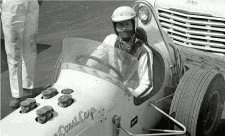Should NASCAR Races Be Shortened?
ByI was reading Ernie Saxton's column at phillyBurbs.com and he brought up some good points about how the current length of NASCAR Cup races could be detrimental to fan interest. The topic of shortening races has been brought up in the past and, in fact, Rockingham and Dover had both trimmed their 500-mile races by a hundred miles in the mid- and late-1990s.
Why 500 Miles?
Somehow or another NASCAR eventually evolved into featuring primarily 500-mile race distances, or something similar (such as 500 laps at Bristol). Like running, motorsports has a diversity of race lengths aimed to test different strengths. For example, a 400-meter sprint emphasizes the runners' power (strength and speed). The most analogous form of motorsports to a 400m sprint would be what we typically see at our local short track. A marathon run, on the other hand, tests the runners' endurance -- like auto racing's 12 Hours of Sebring. A NASCAR 500-miler is more like a 5K run -- requiring a mix of both speed and endurance.
In other words, it appears that NASCAR wanted the element of attrition to be a factor in its races. It's not enough to be fast... the driver has to be fast over a long haul.
In previous decades, attrition was a major player in NASCAR races. Five-hundred laps at a place like Bristol must have been hell without power steering. And 500 miles at Talladega before restrictor plates was probably just as hellish on engines. But in today's NASCAR, attrition isn't quite the element it used to be. Mechanical failures are not nearly as common as they were years ago, and driver fatigue is almost unheard of. About the only thing that doesn't last anymore are Goodyear's tires.
Without attrition, is it really important to run 500 miles anymore?
Shorter Races = More Excitement?
So will shorter races be more exciting races? I remember when Dover trimmed its race distances from 500 miles down to 400. For the most part, everyone was on board with that move. (Though many ticket holders wondered if the prices would be trimmed by a fifth as well. They weren't.) So... is Dover any more exciting now that it's 400 miles? Well... I think it's safe to say that there's 100 laps less of boredom, so maybe that could count for something. I mean -- the pain is over quicker, so yes in that sense it's better.
And the Cup series does have a handful of 300-mile races (Phoenix, Loudon). I'm not sure that they're any more popular than the others. Of course the Nationwide series regularly runs 200- and 300-mile races (and with all the Sprint Cup drivers to boot), and there isn't a lot of viewing interest. Likewise, the Indy cars run 200-mile races and... well... we don't even have to go there.
What's the Primary Problem?
NASCAR needs to understand that "race excitement" isn't sufficient for their product. They need to re-generate excitement for their entire Series -- "the big picture". They could have a 50-lap race with a thousand passes and it won't cut the mustard if people aren't interested in the drivers and the drama of the circuit.
Most fans don't tune in just to see passes and crashes. I remember watching four-hour races on television every week just to see if Davey Allison could hold on to the point lead... or to see who Dale Earnhardt was going to wreck next... or to see if Rusty Wallace really would retaliate for being taken out at Bristol.
Between vanilla drivers, cookie-cutter tracks and the "Race for the Chase" format, NASCAR has pretty much flushed those concepts down the toilet and taken much of the fans' interest down with it.
At this point, does it really matter how long the races are?
Tidbits to Ponder
Here are some interesting facts from Fox Sports (via Jayski.com):
- After Dover, Cup races were averaging a caution period every 40 miles of racing. In 2008 the average was one every 45 miles. In 2001, one every 63 miles. In 1999, one every 72 miles.
- Through Dover, Cup race speeds had averaged 118 mph. In 2008, race speeds averaged 124 mph. In 2001, 128 mph. And in 1999, 130 mph.

